IPS vs LED Monitor: Which One is Best For You?

Today, I am here with an ultimate guide on IPS vs LED.
If you are shopping for a monitor, you will undoubtedly come across a variety of different acronyms, and some of them might be confusing for you.
There are several display technologies to which you may be exposed, including LED, IPS, LCD, and TFT.
Choosing the right monitor is critical to a PC setup’s quality. People often have regrets later on if they choose the wrong one. However, many are still unsure whether IPS or LED monitors are the best choice.
IPS and LED monitors are compared in detail in this article to assist you in choosing the right one for you.
This article explains IPS vs LED displays in simple terms to answer your questions.
IPS vs LED: A Side-by-Side Comparison
IPS | LED |
Stands for In-Plane Switching | Stands for Light Emitting Diode |
Takes up more power and has a long response time | Takes up less energy and has a fast response time |
Great screen consistency and very accurate colors | Excellent image quality with great contrast ratio and bright screen |
Wide viewing angles without any shifts in color | Wide viewing angles but slightly less range than IPS |
Before I go further, let’s dig into IPS vs LED display panels.
IPS Display Panel

IPS is one of the excellent upgrades in display technologies. It came out in the mid-1990s but is just beginning to become a popular option for monitors and TVs.
IPS displays have undergone substantial development since their initial release, and many of their drawbacks have been eliminated due to new options and cross-platform compatibility.
The full form of IPS is In-Plane Switching. It’s a type of LCD display technology.
Many users prefer IPS display panels over LED display panels because of their wide viewing angles and sharp color accuracy. IPS panels are also popular for desktop monitors compared to VA and TN panels.
The IPS display offers liquid crystal panels that are aligned in parallel, which introduces lush colors. The quality of images can be improved with polarizing filters whose transmission axes are aligned in the same direction. Because LED crystals are at right angles, IPS panels feature liquid crystals lined up parallel to provide wide viewing angles and color precision.
LED Display Panel

The full form of LED Light Emitting Diodes. It is an elegant and simple display technology dating back to 1962.
A picture is created using small diodes that light up in a specific manner to make up the entire LED display.
Many people confuse between LED and LCD.
Well, LCD is an older technology than LED. LED is an upgrade to LCD display.
LCD & LED are equipped with liquid crystals that help generate images on the display panel. However, LEDs contain an additional feature of the backlight.
An LED screen or TV can be the best option for various applications. Many companies combine IPS with LED technology to produce the best results.
Now that you know what an LED display is and how it works, let’s examine some pros and cons.
Now, you understand the difference between IPS vs LED.
Major Differences Between IPS vs LED
When purchasing a new monitor, most users are unsure whether to get an IPS or LED panel. You must carefully examine every aspect to get the best experience. You must consider many factors, such as refresh rate, response time, black stabilizer, color modes, etc. But, one important factor is panel type.
The panel installed on a desktop monitor affects several significant characteristics. As a result, the monitor’s compatibility is also affected, as specifications vary.
When purchasing a premium desktop monitor, you should carefully consider the following comparison and determine whether an IPS or LED monitor is better suited. In the coming sections, I will compare IPS vs LED monitors based on several important factors.
IPS Desktop Monitors

An IPS monitor is a desktop monitor that uses an IPS display panel. Like the IPS display panels I discussed above, IPS monitors have the same pros and cons. However, IPS monitors are currently one of the most popular choices for desktop users.
IPS monitors could not keep up with heavy usage for a long time due to low refresh rates and response times. However, recent offerings have combined IPS technology with other options to solve these issues.
Therefore, IPS monitors offer a high refresh rate and a low response time in the premium range. In addition, most IPS monitors are suitable for entertainment because they provide higher resolutions and HDR compatibility.
LED Desktop Monitors

If you search for longevity and reliable performance for all applications, LED desktop monitors are a good option.
Basic LED monitors are more affordable than high-quality IPS monitors.
The biggest benefit of LED monitors is their economical power usage, which also guarantees long-term reliability. Overall temperature levels on LED desktop displays are significantly lower than on IPS monitors.
With VA panel technology, LED monitors to have a fast refresh rate and response time, making them perfect for hardcore gaming. The disadvantages of getting a LED desktop monitor include limited viewing angles, inconsistent contrast ratios, and display panel fatigue from long-term use.
Some great IPS panel alternatives can be found in LED monitors where the display panel technology is paired with LED, LCD, or TN panels to overcome drawbacks.
IPS vs LED: A Quick Comparison
Now, you might have understood the difference between IPS vs LED monitors.
If you’re still unsure which one is perfect for you, here is my quick comparison between them.
Brightness and Color Accuracy
The IPS display is the best option for brightness & color accuracy.
The IPS panels offer a very high brightness level with their unique construction and working method.
In addition to maintaining accurate colors and hue levels regardless of viewing angles, IPS panels are excellent for both primary and secondary screens. Wide viewing angles on TVs with IPS panels will also enhance the viewing experience.
You will get better performance in terms of local brightness with an LED monitor. The array of LED lights powering the display dims the darker areas perfectly, resulting in a higher contrast ratio.
An LED monitor may appear to have darker areas than an IPS monitor, but color accuracy and temperature are still affected by viewing angles.
Temperature Levels
An IPS panel produces more heat when it is active because of increased power consumption. If you live in a hot climate, it’s not an ideal condition for a monitor or a television. Problems with the panel might arise as a result of higher temperature levels.
LED monitors also produce comparable luminance levels but without excessive heat generation. You can install an LED display panel on your desk without worrying about increased temperature levels on your monitor.
Refresh Rate
A monitor’s refresh rate is the no. of times a screen changes in a second, measured in Hz units. A high refresh rate is crucial for competitive games like CSGO, Call of Duty, PUBG, etc.
Due to technological differences, IPS display panels have always had a quicker response time than LED display panels.
IPS display panels have recently been released, providing up to 144 Hz refresh rates on mid-range monitors. Alternatively, you can purchase a premium-quality IPS display panel-powered monitor that provides high refresh rates.
IPS panels still lag behind VA and TN panels regarding refresh rate and response time. Specifically, TN panels are best for high-paced FPS games because they have the quickest response time at the expense of image quality. You can usually get 1 ms of response time from an LED panel like VA or TN.
Overall Image Quality
IPS display panels provide the best results in nearly every category regarding image quality. IPS panels offer the best performance across the board, whether it be image sharpness, clarity, or viewing angles.
However, IPS panels tend to have poor contrast ratios due to their high brightness levels. On the other hand, LED panels provide excellent black levels and contrast ratios, which result in a more realistic image. If you choose a VA panel, you will enjoy excellent image quality and deep black tones for a more realistic picture.
Power Draw
A desktop monitor’s power consumption is also essential. In addition to a powerful CPU and graphics card, your system may already be power-hungry. Thus, you would not want to add a monitor as well.
LED monitors consume less power than IPS monitors. Although IPS panels offer higher brightness levels, they consume more power. Furthermore, IPS panels tend to consume more power than others considering their overall performance and power consumption.
An LED monitor uses less power than an IPS monitor, and the LED panels offer fairly bright images. Local dimming is one of the reasons.
Running costs for LED screens are consequently lower.
Price Range
IPS monitors are more costly than LED monitors because IPS panels are much more costly than LEDs. The price of IPS monitors is also higher because they are usually combined with other display technologies to counter their shortcomings.
Although the market is saturated with excellent monitors at affordable prices, you can still find a VA or TN display technology alternative within the same price range. You may choose a higher resolution or a faster refresh rate instead of an IPS panel in the same budget.
Is IPS Better Than LED?
LED TVs provide little energy consumption and bright pictures with a long-lasting backlight. IPS displays have better color accuracy and image quality with small viewing angles.
Is IPS Better for Your Eyes?
IPS causes more eye strain than LEDs. They provide decent color representation and excellent contrast ratios, reducing your eyes’ effort to understand things.
Even at a refresh rate of 280 Hz, these panels help reduce input lag and combat eye-straining screen effects like tearing.
Which Panel is Best For Gaming?
The most important factors for gaming are resolution, refresh rate, screen size, and response time. Color accuracy and viewing angles aren’t a big deal unless you’re planning on using your computer as a couch. Since you usually place your primary monitor directly in front of your seat, you won’t need to worry about viewing angles.
VA or TN panels are often a better choice for gaming. These monitors provide higher refresh rates and screen resolutions for the same price, which is always a better deal. You may always invest in an IPS monitor for single-player games that benefit from better display quality and brightness levels.
IPS vs LED: Which Monitor Should You Buy?
Choosing between IPS vs LED displays can be difficult, especially if you’re unfamiliar with the technology. Here are the factors you need to consider before making a decision.
Monitor’s Use
Choose a monitor that matches your needs. If you want a monitor for creative visual applications, choose an IPS monitor. This LCD panel allows you to sit at various angles, get more detailed graphics, and has color accuracy.
If you’re looking for a monitor for fast-paced shooting games, an LED monitor might be just what you need. An LED monitor with a TN panel accommodating limited viewing angles and lower display quality would be an excellent choice. Organic Light-Emitting Diodes (OLED monitors) are a perfect choice if you want higher display quality than what you get with pure LED monitors.
Pictures or Functionality
Performance or visuals are critical when choosing between IPS displays and LED monitors.
Despite the exceptional visual quality of IPS monitors, you will have to deal with the increased energy consumption. A frequently hot IPS monitor might cause problems with the unit’s longevity, which explains why some believe IPS displays are unreliable and inferior in performance compared to LED monitors.
Despite not having the incredible visual and color accuracy of an IPS display, LED monitors are less susceptible to overheating. Many people consider LED monitor performance to be reliable and consistent.
Budget’s Panel
When purchasing monitors, it’s wise to establish a reasonable price range based on desired capabilities. Regardless of whether they are LED or IPS monitors, the more features and panel combinations there are, the more expensive they will be.
For example, VA and TN Liquid Crystal Display panel types are typically more expensive than pure IPS panels, even if they are included on a monitor.
The S2318HN monitor by Dell, a budget LED monitor, is a great way to get value for your money. In addition to being available at a budget price, you’ll probably find that LED monitors have more attribute compatibility than IPS monitors.
FAQs(Frequently Asked Questions) on IPS vs LED
1. Which is better IPS or LCD display?
The IPS panel technology is a type of LCD panel technology. IPS panels are superior to other LCD technologies, such as VA and TN panels, in terms of viewing angles, color accuracy, and contrast. LCD technology, in general, is being outpaced by LED and OLED technologies.
2. Is IPS brighter than LED?
An IPS monitor has slower response times than most LED monitors, but an LED monitor is brighter and more power-efficient. IPS monitors are the best option if you want wider viewing angles.
3. Is IPS better for eyes?
IPS monitors are distinguished by their liquid crystal displays, which move horizontally to produce exceptional picture quality, wide viewing angles, and precise color matching. IPS monitors provide superb picture quality and wide viewing angles in addition to wide viewing angles.
4. Are IPS screens LED?
IPS (in-plane switching) is one of the popular LCD technologies. All IPS displays are LCDs, but not all LCDs are IPS displays. The molecules inside a liquid crystal are arranged in a certain way to create an IPS display.
5. Is IPS LCD or LED?
In-plane switching is a type of LED display panel technology. IPS panels, composed of LCDs, are renowned for having excellent colors and viewing angles. Among the other types of display panels, TN and VA are the ones with the worst colors and viewing angles.
6. Which is best display type?
The Super AMOLED display produced by Samsung Display is considered the best smartphone OLED display. Samsung Display and other OLED producers (such as LG and BOE Display) produce high-quality OLEDs for smartphones.
7. Do IPS panels burn in?
IPS panels indeed get burn-in. Temporary ghosting appears to be common on specific screens, but permanent burn-in is rare.
8. Is IPS display good for gaming?
IPS delivers vibrant colors in games. IPS monitors outperform all others in terms of viewing angles. With 178/178 degrees on the vertical and horizontal axes, IPS gaming monitors maintain consistent brightness levels even when viewed from extremely low angles.
9. Is IPS better than full HD?
An IPS screen is an LCD display with a resolution of 1920×1080, making it an FHD display. An IPS panel does not have ‘tailing’ when it is touched, like a touch screen. An IPS panel is more expensive to manufacture and uses more power than a TN panel, and has a longer response time.
Related Topics:
Conclusion
When looking for a new display, IPS vs LED display panels are always a matter of confusion. Numerous brands provide a wide variety of options for both IPS and LED displays, which is always a challenge. In my article, I compare these display technologies in depth and discuss them based on several critical variables.
Once you go through my guide, you will find out which monitor is your best option. If you want a TV or desktop monitor for watching movies or working, an IPS panel is the best choice. You will get greater visual quality and viewing angles in this case. VA or TN panels are typically better for gaming. However, VA or TN panels generally are better for gaming.
It’s essential to consider both IPS and LED displays’ advantages when choosing a display technology. Whether you prefer IPS or LED, the trick is finding one that’s a good match for your application.






